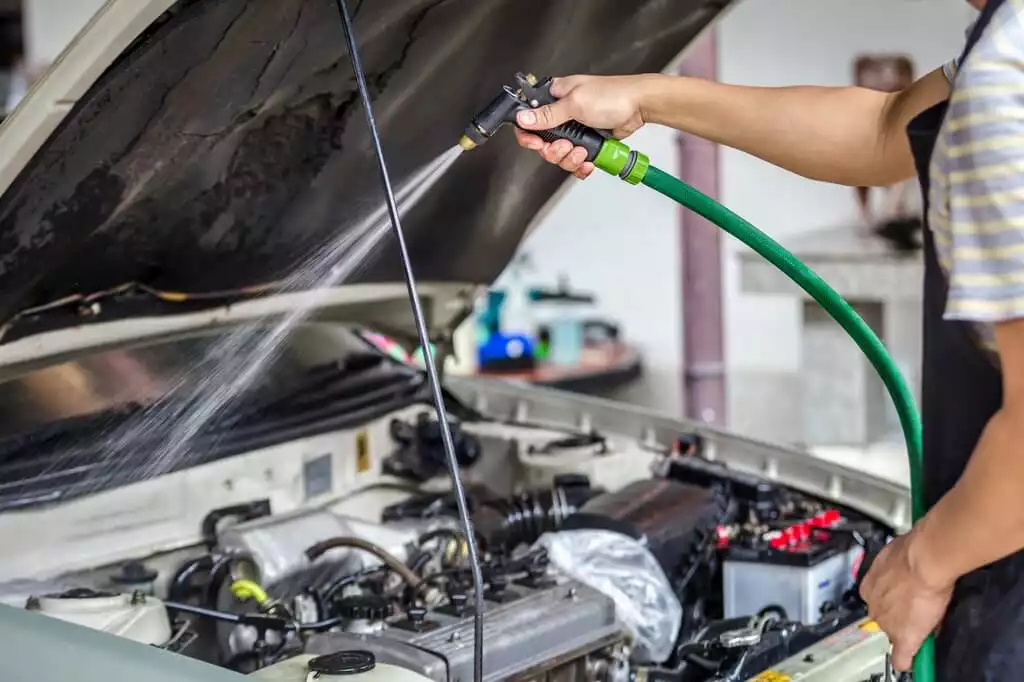If you’re a driver who takes pride in regularly washing your car, you may have noticed that your engine runs a little rough after getting wet. While it may seem counterintuitive, there are a few reasons for this.
- Check to see if water has infiltrated electrical systems
- Cleaning solution may have leaked into the engine itself
In most cases, the problem can be resolved fairly easily by taking your car to a qualified mechanic. However, letting the problem go unaddressed for too long could lead to more serious issues.
So if you notice that your car isn’t running as smoothly as usual after getting wet, be sure to have it checked out right away.
Why is My car running rough after washing the engine?
A clean engine compartment, just like the rest of the vehicle, gives the impression that your automobile has been carefully maintained and is brand new.
Some drivers claim that a spotless motor is more efficient and quickly cools down. However, should you bother if you put aside concerns about how clean your car’s engine looks?
Your car’s electrical system and vital engine parts are located beneath the hood, which is extremely important.
Water in electrical system
This usually happens when drivers attempt to wash their engines with a high-pressure hose without first covering up important electrical components.
When water seeps into the electrical system, it can cause sensors and other components to malfunction, leading to a loss of power and decreased engine performance.
Suppose you suspect water has gotten into your car’s electrical system. In that case, it’s important to take it to a qualified mechanic as soon as possible so they can assess the damage and make any necessary repairs.
Cleaning Solution in Engine
Because soap or cleaners have gotten into the engine itself. This is usually the result of overzealous drivers who try to clean every nook and cranny of their engines without first taking proper precautions.
When soap or cleaners enter an engine, they can break down oil and other vital fluids, leading to decreased performance and increased wear and tear on engine parts.
If you think soap or cleaners may have gotten into your engine, be sure to have, it checked out by a professional as soon as possible so they can flush the system and replace any damaged fluids.
Cleaning the engine of a hot automobile is an even worse idea than washing the car itself. The metal in your car’s engine might stress and shatter if it gets too hot.
Some tiny metal parts are so delicate that they’ll bend in half if submerged in cold water. It’s best to let the vehicle cool down a little, even if you’re using warm steam.
Explained above are the possible reasons your engine is running rough after washing it.
Does washing the car damage the engine?
Despite our desire to give our automobile the kind of care that it deserves, a thorough engine wash isn’t the best idea since water and engines don’t get along very well.
Many engine parts are vulnerable to water, so taking your automobile through a car wash might be harmful. This can happen if these components become wet and rust.
More modern vehicles have superior insulation for their engines, reducing the likelihood of damage from flooding. While these components are water-resistant, they are not impervious.
Your car’s performance and safety might be affected if you don’t know which sections are the most vulnerable to wear and tear.
However, washing your car’s engine is a rather harmless task if you take the necessary precautions. In the long run, keeping your car’s engine clean is better than letting it sit uncleanly.
What to do when a car runs rough after washing the engine?
Inspecting your vehicle for damage after being washed at a car wash is a smart practice. It’s not always easy to see whether water has gotten into your engine, so it’s best to let it idle for a few minutes before driving away.
In addition to a basic visual assessment for obvious damage, you should also.
- Listen for any strange noises coming from the motor.
- Look for any strange odors; these might indicate electrical damage or other problems, so it’s important to inspect the area thoroughly.
- Stop the car wash operation and call for help if you see anything out of the norm; continuing to drive the automobile might worsen the problem.
- Get the staff to take another pass with the blow dryer to ensure all water-sensitive sections are dry.
- Be sure to inspect the air filter, spark plugs, and any other easily accessible internal parts.
- After waiting for any locations that may have been polluted by water to dry, try starting the vehicle again to see whether the problem has been fixed.
If the automobile still doesn’t function properly, try these steps:
- Give the boss a heads up. If you need help, it’s best to talk to the shop’s owner or manager. For the proprietor’s sake, it is in everyone’s interest to see that you are completely satisfied before you go.
- Verify that thorough notes were taken of the occurrence. You must have an incident record that recognizes the problems and the fact that they became evident after you washed the automobile. Check that the paperwork has been signed by the carwash’s owner or a representative with authority.
- Talk to your insurer about it. You can also contact your insurance provider for more advice and help with any claims you might file.
- Consult a lawyer. You have the right to have your vehicle cleaned without agreeing to any harm done to it.
Should the car engine be washed?
Regular engine cleaning will help you spot issues before they damage your car’s performance. Also, the engine’s finish will be protected against dirt, muck, and other particles.
Cleaning your car’s engine can be done whenever you choose. The frequency with which you should clean your car’s engine is mostly determined by where you reside.
You should clean your automobile engine at least twice a year, even if you live in a city or other metropolitan region with relatively clean roads.
Every three months, if you live in a dry environment where a lot of dust can settle. Or, if you live in a region that gets a lot of rain or snow, cleaning the engine compartment every two months is a good idea.
Lessons Learned
Even though current automobile engines are more protected from water, you shouldn’t take any chances.
If the person cleaning it is careful, there is little danger of harm. Keeping an engine constantly filthy is far more harmful than the occasional washing.
Thus:
- If you don’t wash your automobile carefully, you might damage the engine.
- In comparison to letting a filthy engine go, maintaining it has more positive outcomes.
- If your vehicle’s engine is damaged during a car wash, you should try to work out a settlement with the business first.

